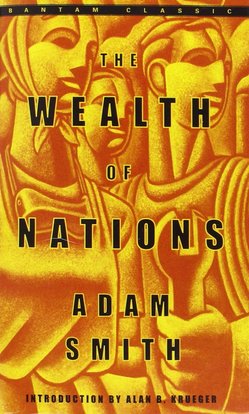|
5/11/2017 0 Comments On the Benevolence of the ButcherHave you ever heard of Adam Smith? Other than having the plainest name ever, Adam Smith was a philosopher and economist in the 18th century and he wrote a very important work called On the Wealth of Nations. This book was the first to outline the ideas of capitalism at the beginning of the industrial revolution—it basically helped to usher in the economy that we use today at every turn in our daily lives. This work was profound, but it was also profoundly perverse. Let’s take a look at one of the most famous excerpts from this work:
Smith is a hard-nosed proponent of self-love, or so he thinks. He is proposing here that the entirety of the economy is based on each one of us looking after our own self-interest, and this self-interest, he seems to automatically presume, is synonymous with self-love. Interestingly enough, if we attempt to apply this particular view of self-love to another economy, one much smaller, we bring about an effect that I think any one of us will find unpalatable: that of the atomic family within a household: if a household of mother, father and two children, for example, operated based on the “self-love” principle in which all entities were operating based on what they needed, drawing from each other that which each person needed to survive materialistically and intellectually, what would be the end result? Disconnection. This isn’t self-love. This is self-serving narcissism. Let me explain a little further. In the quotation above, Smith juxtaposes self-love with benevolence, as if the two are incongruent. He couldn't be more wrong. These ideas espoused by Smith are drawing on a particular intuitive understanding that Smith had of the order of nature and, namely, the order of the universe. Smith had a deeply flawed understanding of how the forces of nature work, and the reason for my passion in condemning these ideas here is that it never occurred to Smith how out of sync his ideas were with the reality of the attuned inner life. Here is this basic idea that not only drives the division of labour, according to Smith, but currently drives the entirety of the global economy: it is by each of us being self-serving that we survive collectively. This idea is so unbelievably wrong, yet it is the fuel that makes the economy grow and the very drum that holds the beat of disconnect in our society. This view was a child of the Enlightenment, a product of reducing the human being to a rational animal and measuring him as such in comparison with the animal kingdom. The universe, according to this understanding, is subject to our will, to our bending and achieving; we see these views come to full fruition in Nietzsche’s Ubermensch, the man who creates his own values and wills them into being through the ascetical ideal. The universe, in this schema, is our responsive slave. It can’t be like this. Anyone who has ever, even just for a moment, stood back in awe at the perfect alignment of the universe in a moment in time that presents itself before us as such, one that is really unspeakable because you can try to convey it to someone but once it is expressed into words it loses its mystery and poetry, knows that this isn’t the way nature works; if you have felt that feeling before, a feeling that you feel with increasing regularity the more inner-healing that you do, you just intuitively know that this survivalist principle is deeply flawed: we aren’t here to survive, nor do we thrive as human beings in survivalist mode (because when we are in survivalist mode is when we are at our worst); rather, we thrive when we feel connected and aligned, and when we can vulnerably engage our work. Because when we open our heart to what we love to do, it becomes a wellspring of joy and meaning. Again, Smith’s survivalist economical system is a subtle but profound perversion of the essence of how energy works, of the spirit of nature and of the human being. The human being, as a worker or entrepreneur within our contemporary economy, does not find her glorification in solely serving one’s apparent needs. Further, the implication of this lens is that the self-serving human being has the ability to accurately discern her own needs; yet, she does not. The needs of the self-centered human being are illusory in nature because they originate in a place of need rather than a place of offering. This place of need is one, quite literally, of validation; it’s reactionary in nature and has as its sole purpose to cork the propensity to be vulnerable in any given moment. In order to operate as human beings broadly, and as workers and entrepreneurs within this perverse economic system specifically, we must cultivate the virtue of surrender. One could argue that surrendering as an entrepreneur will not cause the economy to grow insofar as this strategic outlook will cause one’s business plan to not be focused enough, to not have enough of a niche. To those individuals I will encourage to widen your view, not to the intricate interconnectedness of the global economy, but to the macrocosmic wonder of the universe. One is an ideological product of the human being’s need for control and materialistic gain, while the other is the eternal product of the unconditional love of the Divine. I mean, really, let’s get with it here. Let’s put things in the proper perspective so we can live like real human beings, happy and fulfilled, not head down on the steering wheel or computer trying to fucking win all the time. What does this surrender look like? Well, within this paradigm that I am presenting here we find our truest expression of natural intelligence: not strictly by a measurement of our intellect (a measure of intelligence only those who haven’t explored the other parts of their humanity believe is real), but by the everyday elegance of our work; not our job, but our work, the work that destroys our insides if it can’t find expression, the work that gets in our bones and brings us to the ground to listen to the beat of it so we know how to dance through life. This is the paradigm of conscious workers and entrepreneurs: to be in a state of continuous healing so that we become a presence of healing for others, which is an automatic response to finding the work that fulfills us the most and presenting it as an offering to our fellow brothers and sisters. This is what unites us all, what makes us all equal and the same, yet allows for our unique individuality. The work we do is our embodied benevolence. Our work is in how we are aligned, and we must exhaust all possible resources in our efforts to discern this alignment. The virtue of the entrepreneur is not in being a headstrong force of profitability, of ego(survival)-centeredness; rather, the virtue of the entrepreneur is in her willingness to surrender into the alignment of her own path, a path of entrepreneurial benevolence, an alignment that we have the responsibility and duty to work very hard to discern. John Tzavelas
0 Comments
Leave a Reply. |
Archives
January 2023
CategoriesAll Advice Affirmation Animal Teachings Anxiety Assessment Tool Astrology Boundaries Breath Ceremony Chanting Cleaning Coaching Cooking Creativity Dream Earth Eco Spirituality Eco-Spirituality Fatigue Fear Fertility And Pregnancy Grief Grounding Happiness Honouring Our Elders Hormones Intention Intentionality Limiting Beliefs Living Seasonally Love Mars Retrograde Meditation Mindfulness Nature Nutrition Overwhelm Palmistry Practice Feature Prayer Psychotherapy Radical Self Nourishment Recipe Recovery Reiki Renewal Self Betrayal Self Care Self-Care Self-Compassion Self-expression Self Love Self-Love Self-worth Shinrin-Yoku Sleep Sound Healing Sounding Stress Symbolism Tarot Tools And Techniques Transformation Vitamin N Workshop Yoga |
257 Danforth Ave Toronto |
Connect
|



 RSS Feed
RSS Feed